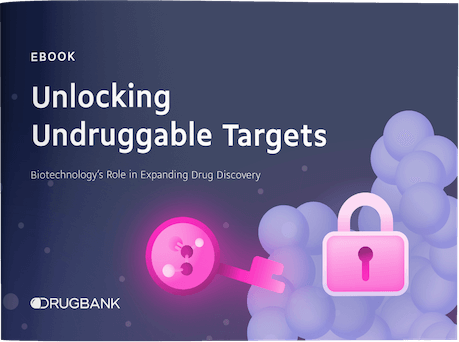Explore a selection of our essential drug information below, or:
Overview
- DrugBank ID
- DB05815
- Type
- Biotech
- Clinical Trials
- Phase 0
- 0
- Phase 1
- 0
- Phase 2
- 0
- Phase 3
- 0
- Phase 4
- 0
Identification
- Generic Name
- GnRH pharmaccine
- DrugBank Accession Number
- DB05815
- Background
The GnRH pharmaccine consists of synthetic peptides (constructed to "look like" GnRH), which are bound chemically to a carrier and suspended in a proprietary "delivery vehicle". The pharmaccine is administered intramuscularly to the patient by injection and induces an immune response or production of antibodies in the patient, which neutralize GnRH thus removing it from circulation.
- Type
- Biotech
- Groups
- Investigational
- Biologic Classification
- Protein Based Therapies
Other protein based therapies - Protein Chemical Formula
- C60H73N15O13
- Protein Average Weight
- 1212.3143 Da
- Sequences
- Not Available
- Synonyms
- Not Available
Pharmacology
- Indication
Investigated for use/treatment in prostate cancer.
 Reduce drug development failure ratesBuild, train, & validate machine-learning modelswith evidence-based and structured datasets.Build, train, & validate predictive machine-learning models with structured datasets.
Reduce drug development failure ratesBuild, train, & validate machine-learning modelswith evidence-based and structured datasets.Build, train, & validate predictive machine-learning models with structured datasets.- Contraindications & Blackbox Warnings
 Prevent Adverse Drug Events TodayTap into our Clinical API for life-saving information on contraindications & blackbox warnings, population restrictions, harmful risks, & more.Avoid life-threatening adverse drug events with our Clinical API
Prevent Adverse Drug Events TodayTap into our Clinical API for life-saving information on contraindications & blackbox warnings, population restrictions, harmful risks, & more.Avoid life-threatening adverse drug events with our Clinical API- Pharmacodynamics
Not Available
- Mechanism of action
The immunological neutralization of Gonadotropin Releasing Hormone (GnRH) by the antibodies induced by GnRH pharmaccine shuts down the production of testosterone in the testes. Testosterone fuels prostate cancer, both early stage, primary cancer and metastatic (spreading) cancer. Like physical castration, hormonal, or biological blockage of testosterone has been shown to be efficacious in humans for the treatment of both early and late state prostate cancer. Aphton's GnRH pharmaccine, which is expected to be reversible based on the mechanism of action (in contrast to surgical castration), induces hormonal, or biological blockage of testosterone.
- Absorption
Not Available
- Volume of distribution
Not Available
- Protein binding
Not Available
- Metabolism
- Not Available
- Route of elimination
Not Available
- Half-life
Not Available
- Clearance
Not Available
- Adverse Effects
 Improve decision support & research outcomesWith structured adverse effects data, including: blackbox warnings, adverse reactions, warning & precautions, & incidence rates. View sample adverse effects data in our new Data Library!Improve decision support & research outcomes with our structured adverse effects data.
Improve decision support & research outcomesWith structured adverse effects data, including: blackbox warnings, adverse reactions, warning & precautions, & incidence rates. View sample adverse effects data in our new Data Library!Improve decision support & research outcomes with our structured adverse effects data.- Toxicity
Not Available
- Pathways
- Not Available
- Pharmacogenomic Effects/ADRs
- Not Available
Interactions
- Drug Interactions
- This information should not be interpreted without the help of a healthcare provider. If you believe you are experiencing an interaction, contact a healthcare provider immediately. The absence of an interaction does not necessarily mean no interactions exist.Not Available
- Food Interactions
- Not Available
Products
 Drug product information from 10+ global regionsOur datasets provide approved product information including:dosage, form, labeller, route of administration, and marketing period.Access drug product information from over 10 global regions.
Drug product information from 10+ global regionsOur datasets provide approved product information including:dosage, form, labeller, route of administration, and marketing period.Access drug product information from over 10 global regions.- International/Other Brands
- Gonadimmune
Categories
- Drug Categories
- Not Available
- Chemical TaxonomyProvided by Classyfire
- Description
- Not Available
- Kingdom
- Organic Compounds
- Super Class
- Organic Acids
- Class
- Carboxylic Acids and Derivatives
- Sub Class
- Amino Acids, Peptides, and Analogues
- Direct Parent
- Peptides
- Alternative Parents
- Not Available
- Substituents
- Not Available
- Molecular Framework
- Not Available
- External Descriptors
- Not Available
- Affected organisms
- Not Available
Chemical Identifiers
- UNII
- Not Available
- CAS number
- Not Available
References
- General References
- Jacobs E, Watson SA, Michaeli D, Ellis IO, Robertson JF: Anti-gonadotrophin releasing hormone antibodies inhibit the growth of MCF7 human breast cancer xenografts. Br J Cancer. 1999 May;80(3-4):352-9. [Article]
- External Links
- PubChem Substance
- 347910246
Clinical Trials
- Clinical Trials
Clinical Trial & Rare Diseases Add-on Data Package
Explore 4,000+ rare diseases, orphan drugs & condition pairs, clinical trial why stopped data, & more. Preview package Phase Status Purpose Conditions Count Start Date Why Stopped 100+ additional columns Unlock 175K+ rows when you subscribe.View sample data
Pharmacoeconomics
- Manufacturers
- Not Available
- Packagers
- Not Available
- Dosage Forms
- Not Available
- Prices
- Not Available
- Patents
- Not Available
Properties
- State
- Solid
- Experimental Properties
- Not Available
Drug created at November 18, 2007 18:28 / Updated at June 12, 2020 16:52


